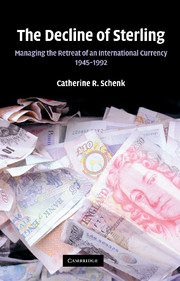Book contents
- Frontmatter
- Contents
- List of figures
- List of tables
- Acknowledgements
- 1 Introduction
- Part I Reconstructing the International Monetary System 1945–1959
- Part II Accelerating the Retreat: Sterling in the 1960s
- Part III Sterling's Final Retreat 1970–1992
- 9 Sterling and the end of Bretton Woods
- 10 Years of crisis 1973–1979
- 11 The aftermath 1980–1992
- 12 Summary and overview
- Index
11 - The aftermath 1980–1992
Published online by Cambridge University Press: 04 May 2010
- Frontmatter
- Contents
- List of figures
- List of tables
- Acknowledgements
- 1 Introduction
- Part I Reconstructing the International Monetary System 1945–1959
- Part II Accelerating the Retreat: Sterling in the 1960s
- Part III Sterling's Final Retreat 1970–1992
- 9 Sterling and the end of Bretton Woods
- 10 Years of crisis 1973–1979
- 11 The aftermath 1980–1992
- 12 Summary and overview
- Index
Summary
The 1980s were dominated by the governments headed by Margaret Thatcher, which transformed the United Kingdom's domestic political landscape with a radical emphasis on liberalisation and privatisation. The last external capital controls were abandoned in October 1979 and the financial system was deregulated, culminating in ‘Big Bang’ in October 1986, which transformed the practice of trading in the City and restored its competitiveness through the 1990s. As chapter 10 showed, by the end of the 1970s sterling had effectively ended its role as an important reserve or commercial currency. Table 11.1 shows that, in the 1980s, sterling never accounted for more than 3 per cent of global foreign exchange reserves, falling behind not only the US dollar but also the Deutschmark and the yen as a reserve asset. Despite the stability in the share of total reserves, figure 11.1 shows that the real value, based on 1969 prices, increased in the 1980s after decreasing from 1975 to 1978.
While the story of the 1980s is not core to the narrative of managing sterling's retreat as an international currency, the continuing importance of sterling's exchange rate policy to Britain's changing place in the world does warrant a brief epilogue, culminating in the dramatic 1992 fallout from the Exchange Rate Mechanism. During these years sterling was defined variously as a petrocurrency, as a symbol of national independence and distinction from Europe and, for a brief period, as a European currency like those in the core of the European Community.
- Type
- Chapter
- Information
- The Decline of SterlingManaging the Retreat of an International Currency, 1945–1992, pp. 396 - 413Publisher: Cambridge University PressPrint publication year: 2010



